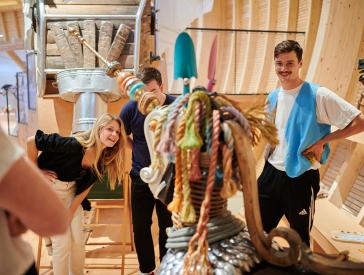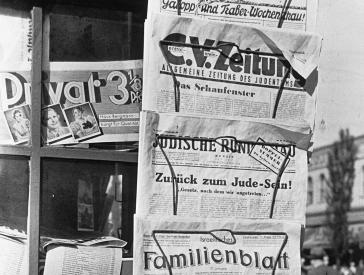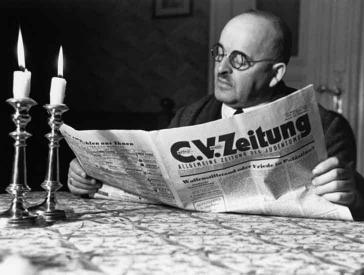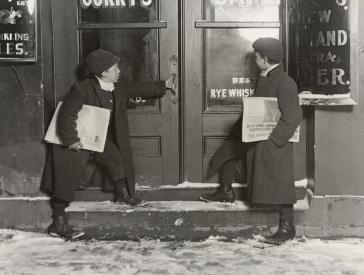Special Exhibitions and Cultural Program in November and December 2011
Press Information
Press Release, Tue 4 Oct 2011
In the recently opened exhibition "How German is it?" marking the Jewish Museum’s 10th anniversary, the museum explores phenomena that lie somewhere between national consciousness, a sense of home, belonging, and exclusion. The program in the months of November and December is also concerned with the questions of whether there is a German identity and how it might be. Walks through the city, readings, talks, and film showings offer opportunities to consider these questions. Furthermore, the Hanukkah festival is approaching fast with the first concert in Berlin by the Zamir Chorale of Boston as a special highlight.
- Kontakt
-
Press office
T +49 (0)30 259 93 419
presse@jmberlin.de - Address
Jewish Museum Berlin Foundation
Lindenstraße 9–14
10969 Berlin
Special Exhibition
How German is it? 30 Artists’ Notion of Home
Celebrating Ten Years of the Jewish Museum Berlin
Is there such a thing as a collective national identity? How do they see themselves, the citizens of the Federal Republic of Germany and the people from other countries who live in Berlin, Munich, or Frankfurt – whether they grew up in West or East Germany, whatever religion they practice, whether their origins are Russian, Turkish, or something else? The exhibition addresses these issues through works by thirty artists with different origins and experiences who live or have lived in Germany. The Israeli artist Maya Zack illuminates family and collective memories in "Living Rooms," fictively constructed after the narratives of their former occupants and presented as large 3D pictures. In "Look at Me, I Look at Water," the Ukrainian artist Boris Mikhailov oscillates between his own culture and one that is foreign to him. Julian Rosefeldt’s 4-channel film installation explores the myth of the German forest. "Dirndlmoschee" by the Bosnian artist Azra Akšamija and photos of orthodox Jewish life by the Berlin-based Israeli artist Benyamin Reich are reflections on religious identity. Experiences of foreignness and migration represent a further theme, as seen in the photo series "Ich werde deutsch" (I become German) by the Iran born artist Maziar Moradi.
Eight works were commissioned exclusively for the exhibition and created by the following artists: Arnold Dreyblatt, Via Lewandowsky and Durs Grünbein, Anny and Sibel Öztürk, Julian Rosefeldt, Misha Shenbrot, Azra Akšamija, Lilli Engel and Raffael Rheinsberg, and Paul Brody.
When: 16 September to 29 January 2012
Where: Old Building, first level
Admission: 4 €, reduced rate 2 euros
Program Surrounding the Special Exhibition "How German is it?"
Foreign Contemporaneity: Art Migration in Germany
Talk by Ljudmila Belkin
"Contemporary art" has long been a relative term. During the Cold War, the implicitness of Western art being the only "contemporary" art due to the political and artistic lack of freedom in the Soviet hemisphere was only confirmed. Only art migration presented different ideas about the contemporaneity of art side by side. The desired diversity, however, failed to surface. The unequal balance of power between established "contemporary art" and immigrant art thinking on the one hand and the mutual alienation of the positions on the other determine today’s art in Germany. Ljudmila Belkin’s talk addresses this situation.
When: Thursday 3 November at 7.30 pm
Where: Auditorium on ground level
Admission free
Through Wedding with Misha Shenbrot
Part of the Series "On Home Territory. Walks with Artists from the Exhibition through their Home Districts"
The Moscow-born artist has lived and worked in Berlin since 1992. On this excursion, he takes visitors through his home district and explains his personal perspective on what he likes, what he finds strange, and the places he frequents in his daily life. He also considers how the area has changed over the last 10 years. For the "How German is it?" exhibition, Shenbrot created a surreal biographical narrative from digital imagery in the shape of a peep-box.
When: Sunday 20 November at 11 am
Meeting point: Mauerpark / corner of Oderberger Strasse
Cost: 7 €, reduced rate 5 euros
Bookings for (non-journalists) on tel. +49 (0)30 25993 488 or reservierung@jmberlin.de
A further installment in the series "On Home Territory. Walks with Artists from the Exhibition through their Home Districts" is planned with the artist Maria Thereza Alves for January 2012.
Monday Movies
Mazel Tov
Documentary by Mischka Popp and Thomas Bergmann
(D 2009, 92 mins, German)
Hundreds of thousands of Russian Jews have come to Germany since 1990 – and that not as Holocaust survivors, but in the proud awareness of having liberated the Germans from fascism. The film examines the background to the migration and the problems and opportunities for Germany’s Jewish communities.
When: Monday 14 November at 7.30 pm
Nobody’s Business
Documentary by Alan Berliner
(USA 1996, 58 mins, English original version)
Alan Berliner’s parents came from Eastern Europe to the USA in the first half of the 20th century. The American film director goes in search of traces – despite the clear resistance of his father, who believes it to be "nobody’s business." A story about family memories and the relationships between the generations.
When: Monday 21 November at 7.30 pm
"Wir haben vergessen zurückzukehren" (We forgot to turn back)
Documentary by Fatih Akin
(D 2001, 60 mins, German)
In his first documentary film, Fatih Akin tells the classic immigrant story of his family. His father came as a migrant worker from Turkey to Germany in 1965, stayed here – contrary to the original plan – and started a family. Akin interviewed numerous people from his family’s environment and paints a complex picture of German-Turkish life.
When: Monday 5 December at 7.30 pm
Unsere Vertreibung 1968 (Our expulsion, 1968)
Documentary by Lidia Drozdzynski
(D 2008, 45 mins, German)
Polish Jews have been expelled from their home in their thousands since 1968. The government had attempted to divert the population’s outrage about the severe political and economic problems with an antisemitic campaign. Lidia Drozdzynski’s documentary goes on a very personal search for traces.
When: Monday 12 December at 7.30 pm
The following applies to all events in the Monday Movies series:
Where: Old Building, ground level, Auditorium
Admission free with seat ticket only (available at the cash desk). Ticket reservation (for non-journalists) on tel +49 (0)30 25993 488 or reservierung@jmberlin.de
Cultural Program
Michel Bergmann: Machloikes
Book Presentation with the Author
In the sequel to his successful debut novel "Die Teilacher," Michel Bergmann tells how life continues for the Jewish traders going from door to door eight years after the war. The life-and-soul-of-the-party Robert Fränkel from Berlin has settled down, married, and started his own carpet shop. Suddenly he finds himself summoned by a CIA official to explain why his name crops up in so many SS files. And all Fränkel did in the war was tell jokes….
A cooperation with Arche Publishers
When: Monday 7 November at 7.30 pm
Where: Old Building, ground level, Auditorium
Admission free
Simon Sebag Montefiore: Jerusalem. The Biography
Book Presentation with the Author in English
Jerusalem is the capital city of two peoples, the shrine of three faiths, the site of Judgement Day, and the hot spot of the Middle East conflict. Jerusalem’s is the epic history of 3,000 years of faith, fanaticism, and conflict, but also the coexistence of the most varied cultures. In a gripping narrative, Montefiore describes the numerous epochs of this ever-changing city – its wars, love affairs, kings, prophets, conquerors, saints, and whores. Based in part on unknown archival materials, the author brings the essence of this unique city to life. As only Jerusalem exists twice – in heaven and on earth.
With words of welcome from the British ambassador Simon McDonald.
A cooperation with S. Fischer Publishers.
When: Monday 28 November at 7.30 pm
Where: Old Building, second level, Great Hall
Admission free
Jewish Choral Music in the Glass Courtyard: Zamir Chorale of Boston
The Zamir Chorale of Boston is paying its first visit to Berlin, its baggage filled with a broad repertoire of music spanning thousands of years – pieces by American composers born in Germany, music by Louis Lewandowski and Hanukkah songs. The founder and director of the Zamir Chorale, Joshua Jacobson, is one of the recognized greats of Jewish choral music. He enriches the performances of his choir with narratives on the program.
A cooperation with the Louis Lewandowski Festival.
When: Saturday 17 December at 7 pm
Where: Glass Courtyard, ground level
Admission: 10 €, reduced rate 8 euros
Bookings (for non-journalists) to info@louis-lewandowski-festival.de




